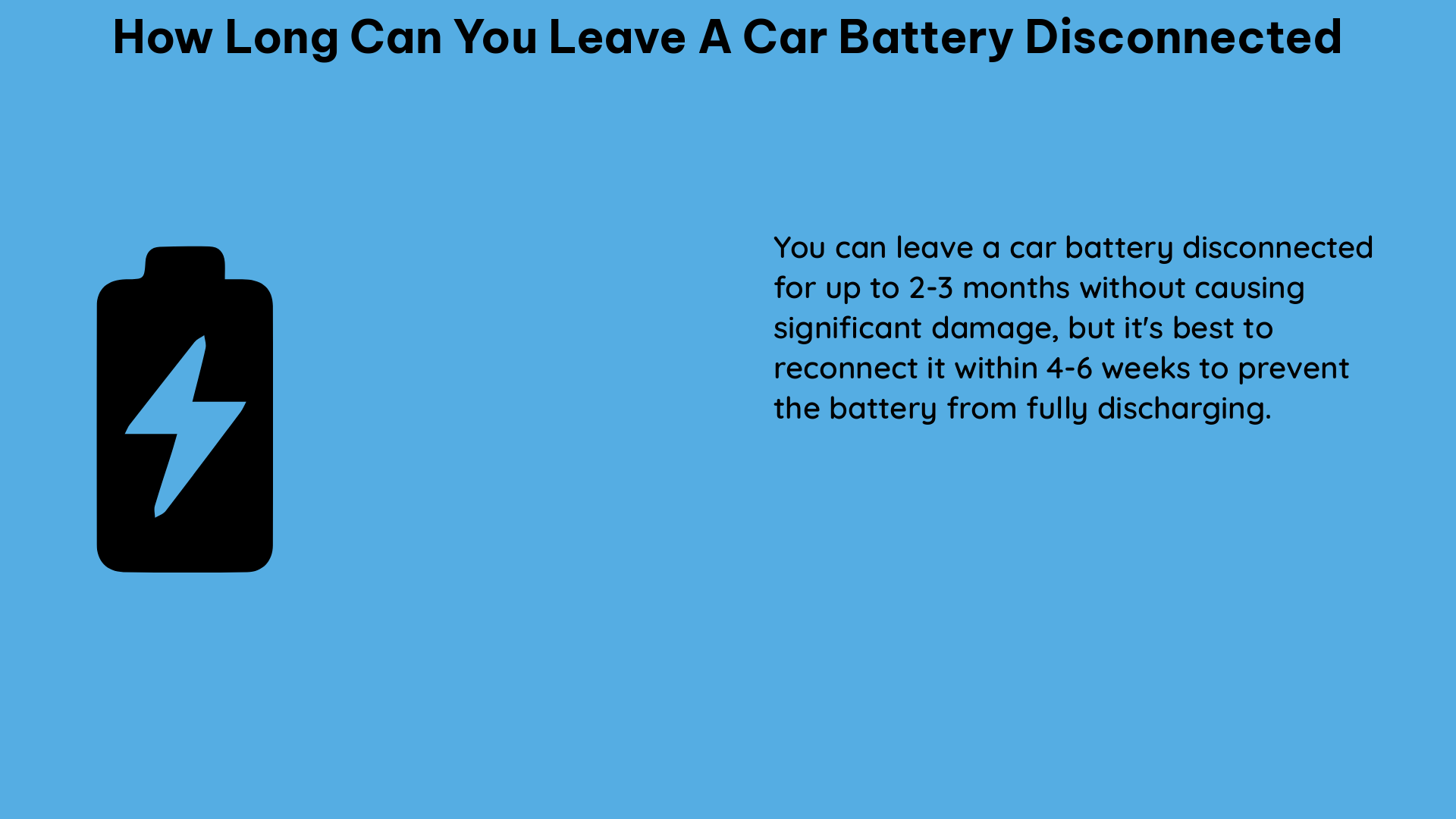The question of how long you can leave a car battery disconnected is a common one, and the answer can vary depending on the type of battery, its age, and the weather conditions. Generally, a car battery can last for about four weeks to two months without being used before it dies. However, if the battery is old or the weather is extremely hot or cold, it may not last as long.
Factors Affecting Battery Lifespan
The lifespan of a car battery when disconnected can be influenced by several factors:
-
Battery Type: Different battery types have varying self-discharge rates. For example, lead-acid batteries typically self-discharge at a rate of 10% or more per month, while AGM (Absorbent Glass Mat) batteries self-discharge at a rate of 5% or more per month. “Pure lead” AGM batteries have an even lower self-discharge rate of 1% or more per month.
-
Battery Age: As a battery ages, its ability to hold a charge decreases. Older batteries will typically have a shorter lifespan when disconnected compared to newer batteries.
-
Temperature: Extreme temperatures, both hot and cold, can accelerate the self-discharge process of a car battery. Ideally, the battery should be stored in a dry place with temperatures between 40 to 60 degrees Fahrenheit.
-
Charge Level: A fully charged battery will last longer when disconnected compared to a partially charged or discharged battery. Leaving a battery in a discharged state for an extended period can lead to sulfation, which can reduce the battery’s lifespan.
Technical Specifications

The technical specifications for how long you can leave a car battery disconnected can vary depending on the type of battery. Here are some general guidelines:
| Battery Type | Self-Discharge Rate |
|---|---|
| Regular Lead-Acid | 10% or more per month |
| AGM | 5% or more per month |
| “Pure Lead” AGM | 1% or more per month |
It’s important to note that these rates can vary depending on the specific battery and its age, so it’s always best to check the manufacturer’s specifications for your particular battery.
DIY: Maintaining a Disconnected Battery
If you plan on leaving your car battery disconnected for an extended period, follow these steps to prevent damage to the cells:
- Remove the Battery: Disconnect the battery from the car and remove it.
- Store the Battery: Store the battery in a dry place with temperatures between 40 to 60 degrees Fahrenheit.
- Charge the Battery: Charge the battery every 30 days to prevent sulfation and maintain its charge.
- Use a Battery Maintainer: Consider using a battery maintainer, which provides a small amount of charge to keep the battery going without overcharging it.
By following these steps, you can help ensure that your car battery stays in good condition and lasts longer, even when disconnected for an extended period.
Conclusion
The length of time you can leave a car battery disconnected depends on various factors, including the type of battery, its age, and the weather conditions. To ensure that your battery stays in good condition, it is recommended to charge it every 30 days if it is disconnected for an extended period and to use a battery maintainer to keep it charged and prevent damage to the cells.
References:
– How long will battery last if disconnected at full charge during winter? – Mechanics Stack Exchange
– Going on vacation for 4 weeks. Can I disconnect the battery and just leave my car parked for the entire 4 weeks?? – Reddit
– How Long Can a Car Sit Before the Battery Dies, Explained – MetroMile Blog
– How long can i leave the battery disconnected for? – Bimmerpost

The lambdageeks.com Core SME Team is a group of experienced subject matter experts from diverse scientific and technical fields including Physics, Chemistry, Technology,Electronics & Electrical Engineering, Automotive, Mechanical Engineering. Our team collaborates to create high-quality, well-researched articles on a wide range of science and technology topics for the lambdageeks.com website.
All Our Senior SME are having more than 7 Years of experience in the respective fields . They are either Working Industry Professionals or assocaited With different Universities. Refer Our Authors Page to get to know About our Core SMEs.